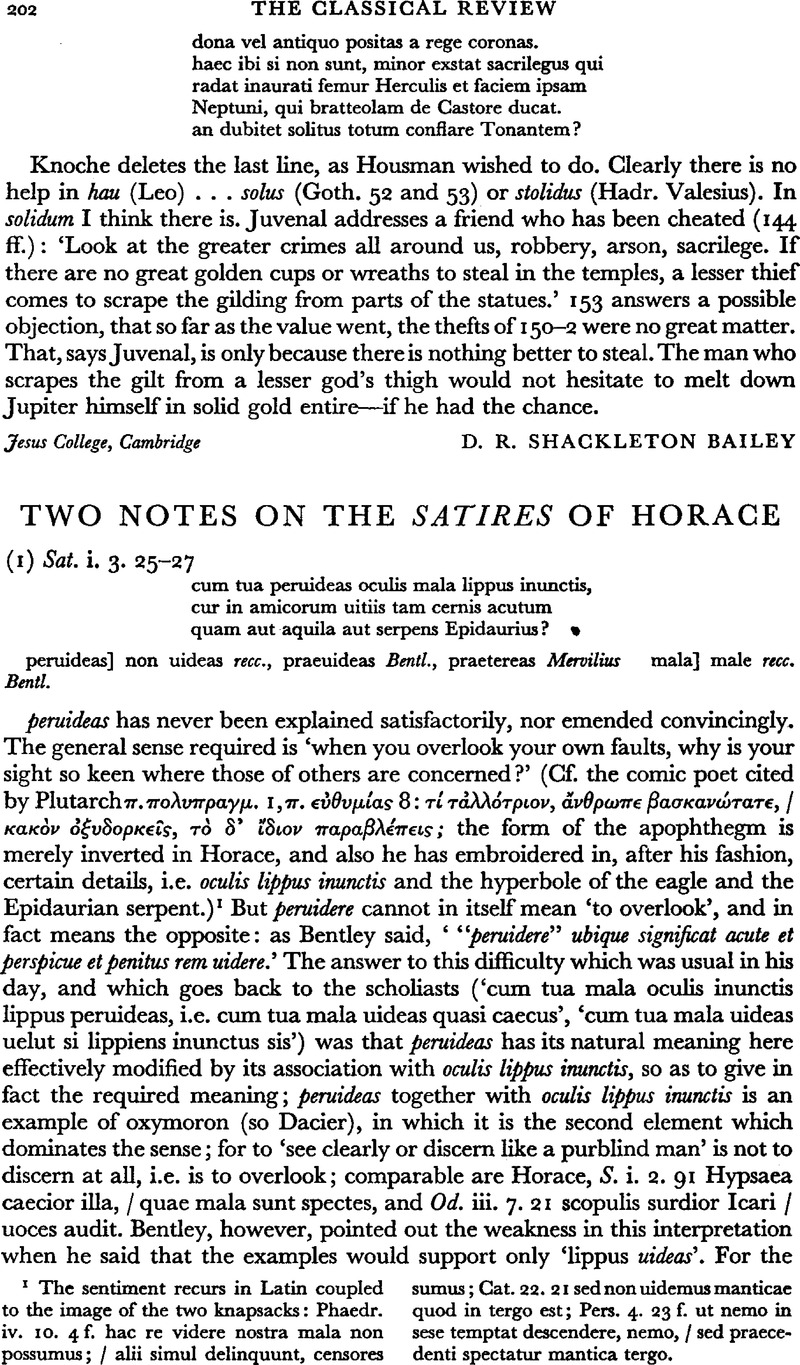No CrossRef data available.
Article contents
Two Notes on the Satires of Horace
Published online by Cambridge University Press: 13 February 2009
Abstract

- Type
- Review Articles
- Information
- Copyright
- Copyright © The Classical Association 1959
References
page 202 note 1 The sentiment recurs in Latin coupled to the image of the two knapsacks: Phaedr. iv. 10. 4f. hac re videre nostra mala non possumus; / alii simul delinquunt, censoressumus; Cat. 22. 21 sed non uidemus manticae quod in tergo est; Pers. 4. 23 f. ut nemo in sese temptat descendere, nemo, / sed praecedenti spectatur mantica tergo.
page 203 note 1 e.g. peruidere = ‘quasi de longinquo uidere’ (Baxter), ‘parum oder male uidere (Hirsch-felder), ‘darüber hinsehen’ (Schmalz). Palmer thought that ‘the preposition is not to be too much pressed’, but it is difficult to see why he thought that Ov. M. xiv. 375 qui peruidet omnia solem supports this idea.
page 203 note 2 male (despite the lines of Phaedrus cited in note 1, p. 202) is in any case the better reading. mala is not needed in the Horatian line, since uitia can easily be supplied from uitiis—a subtler and more elegant form of expression. But a scribe in a hurry to give a construction to tua might easily change male to mala.
page 203 note 3 ‘possis etiam ita, cum tua uitia male peruideas.’
page 203 note 4 Cf. Cat. 61. 141 m. te a tuis glabris abstinere; Cic. Verr. ii. 3. 227 m. perceptos fructus (here = ‘not sufficiently garnered in’, ‘inadequately received’, a meaning which shades into the plain negative ‘not [received] at all’, according to context); Hor. Epist. i. 20. 15 m. parentem asellum; S. ii. 6. 87 tangentis m. singula dente superbo (‘practically not touching’); Ov. Am. i. 14. 51 lacrimas m. continet, Pont. i. 2. 111 m. compositos cineres, F. i. 559 seruata m. parte bourn (i.e. ‘lost’); Tac. H. i. 172 m. coercitam famam, etc.
page 203 note 5 Bentley, who printed male, took it with lippus; Orelli assumes that, if read, it would go with lippus.
page 203 note 6 Examples of negative male so placed are S. ii. 6. 87 and Ov. F. i. 559 (both quoted above). For male after an adjective cf. Cat. 10. 33 sed tu insulsa male et molesta uiuis.
page 204 note 1 For intensive male with an adjective of negative quality cf. male paruus (S. i. 3. 45) But male is not found elsewhere with lippus in Horace or, as far as I know, in Latin.
page 204 note 2 The following may be taken as samples from Book i: 1. 70–72 saccis—tamquam parcere sacris / cogeris; 2. 62–63 quid inter / est in matrona ancilla peccesne togata?; 4. 74–75 in medio qui / scripta foro recitent, sunt multi quique lauantes; 5. 26 impositum late saxis candentibus Anxur (the reading of Kga, possibly correct as against the vulgate saxis late), 49 namque pila lippis inimicum et ludere crudis, 72 paene macros arsit dum turdos uersat in igni. The reason for the peculiar order of our line 25 is partly also the necessity to throw tua into prominence.
page 204 note 3 I believe that Housman, in his Camin bridge lectures on the textual criticism of Book i of the Satires approved Palmer's emendation on textual grounds.




